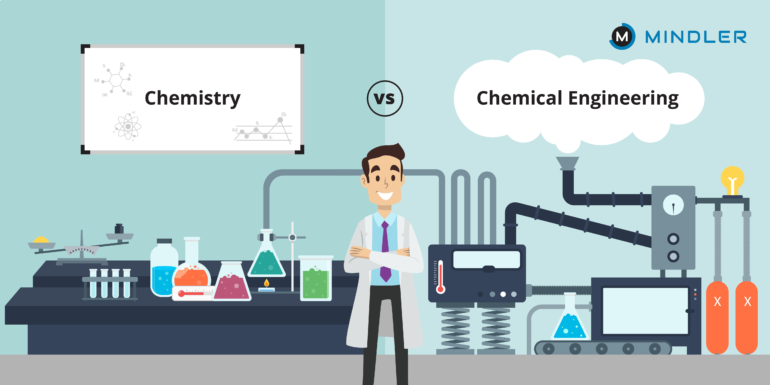Do you possess a zeal for scientific experimentation, unveiling the secret behind invisible ink, mixing around different substances to see what they make, playing around with chemicals in the chemistry lab, and a host of other interesting things that the world of chemistry offers? If yes, then don’t hesitate to dive into the astonishing field of chemistry to quench your curiosity for all things varying in colour, shape and texture.
From the chemical processes taking place in our body to those that happen in the atmosphere, chemistry dominates every aspect of one’s life. If you’ve always been a chemistry enthusiast and the chemistry lab at school feels like a second home to you, then a career in the fields of chemistry or chemical engineering can satisfy your chemical curiosity.
However, most people driven towards chemistry are confused between what to pursue between chemistry and chemical engineering. By the end of this article, you’ll be able to make your choice.
Recommended Read: Think Beyond Engineering: 15 Trending Careers to Pursue with a PCM Combination
What are Chemistry and Chemical Engineering All About?
Chemistry revolves around atoms, molecules, elements and compounds that get together to cause reactions and form matter. These reactions are further used to form new substances and chemistry is that branch of science that deals with the study of matter, its properties, how and why substances combine or separate to form other substances, and how substances interact with energy.
Chemical Engineering is the branch of engineering that combines the knowledge of chemistry, physics, mathematics, and economics to efficiently use, produce, transform, and transport chemicals, materials, and energy. If you want to create and manufacture products like plastics, paper, dyes, medicines, polymers, fertilizers, petrochemicals, food items and design the processes to produce, transform and transport materials to make them usable, then chemical engineering could be your calling.
Recommended Read: Pure Science Courses After Class 12th: A Path for Young Science Lovers
Chemistry Vs. Chemical Engineering
What are the Differences Between Chemistry and Chemical Engineering? Let’s look at the major areas where the two fields differ.
1. Originality and Scale
Chemists create and develop original, new materials and devise related processes. On the other hand, chemical engineers use these materials and processes, upscale them and make them larger as well as more efficient.
2. Subjects to be Studied
In a bachelor’s course in chemistry, you will have to study general chemistry, organic chemistry, inorganic chemistry, physical chemistry, maths and other subjects related to the core understanding of chemistry.
However, since chemical engineering is a field of technology, you will also study subjects like metallurgy, fluid mechanics, textile engineering, engineering chemistry, plastic engineering, applied maths, fluid dynamics, equipment design, etc.
3. Typical Jobs & Places of Work
For chemists, typical jobs within the field of chemistry include; analytical chemist, clinical biochemist, forensic scientist, pharmacologist, research scientist, toxicologist, etc. in industries such as pharmaceuticals, agriculture, paper, plastics, etc.
Chemical engineers can fill roles such as being an on-site engineer or chemical engineer in a variety of industries including textile, energy, biotechnology, healthcare, oil and gas, plastics, pharmaceuticals, food processing, chemical production, cosmetics, etc.
Chemists tend to work in laboratories, offices, classrooms and field. Chemical engineers tend to work at the plant end of research, in laboratories, in the field as well as the boardroom.
Recommended Read: Welcome to the Future: 9 Emerging Careers for Science Students
4. Skills Required
To become a chemist, you should possess immense curiosity to dive into the vast pool of information, have the ability to explore and analyze things, as well as the ability to focus on detail. If you believe you possess the above-mentioned skills, then you can make a name for yourself as a chemist in the industry.
Chemical engineers should possess problem-solving skills, numerical ability, analytical skills and inquisitiveness. If you have these in you, don’t hesitate to pursue chemical engineering.
How to Become a Chemist: Colleges and Courses
Complete 10+2 with Science stream, pursue Bachelors in Chemistry (B.Sc. Chemistry) and then you can further apply for Masters in Chemistry (M.Sc. Chemistry). After possessing these qualifications, you can bag the job of a chemist. However, for research positions, a PhD is preferred.
Some colleges offering B.Sc. Chemistry include:
- Stephen’s College (New Delhi)
- Hindu College (New Delhi)
- Miranda House (New Delhi)
- Loyola College (Chennai)
- Madras Christian College (Chennai)
- Presidency College (Kolkata)
- Christ University (Bengaluru)
- Fergusson College (Pune)
- Xavier’s College (Kolkata)
Recommended Read: Life Beyond IITs: 4 Premier Institutes in India for Pure Science & Research
How to Become a Chemical Engineer: Colleges and Courses
To become a chemical engineer, you need to complete your class 12th with the Science Stream (Physics, Chemistry, Mathematics) and then sit for entrance exams like JEE Main, JEE Advanced, BITSAT, VITEEE, etc. Following this, you can enrol into a B.E. / B.Tech in Chemical Engineering, which is a 4-year course that will make you eligible to work as a chemical engineer.
You can also do master’s level courses after B.E/B.Tech course by clearing the GATE exam (for M.Tech) or go abroad to pursue an MS in Chemical Engineering. A master’s degree opens the door for various specializations, research fellowships, PhD and academic positions for students.
Some colleges offering B.E./B.Tech in Chemical Engineering are:
- IIT (Various locations)
- BITS, Pilani
- NIT (Various locations)
- Delhi Technological University (Delhi)
- Indian School of Mines, Dhanbad
- Institute of Chemical Technology, Mumbai
Summing Up
Someone rightly said that handwork is the key to success and your inquisitive mind combined with hard work can help you reach the soaring skies. The solution to the puzzles of chemistry lie in your mind and if you are driven enough to discover new things, create alternative procedures, experiment with reactions, then the field of chemistry awaits you!








